

MAY • VOL. 5. • SERIES OF 2019
INSIGHTS is a monthly publication of BDB LAW to inform, update and provide perspectives to our clients and readers on significant tax-related court decisions and regulatory issuances (includes BIR, SEC, BSP and various government agencies).

DISCLAIMER: The contents of this Insights are summaries of selected issuances from various government agencies, Court decisions and articles written by our experts. They are intended for guidance only and as such should not be regarded as a substitute for professional advice.
Copyright © 2019 by Du-Baladad and Associates (BDB Law). All rights reserved. No part of this issue covered by this copyright may be produced and/or used in any form or by any means – graphic, electronic and mechanical without the written permission of the publisher.
What's Inside ...
- UPDATES
- Court Issuances
- CTA
- Regulatory Issuances
- BIR Issuances
- BSP Issuances
- SEC Issuances
- IC Issuances
- Court Issuances
- INSIGHTS
- Tax Incentives for Green Jobs
- OUR EXPERTS
- The Personalities

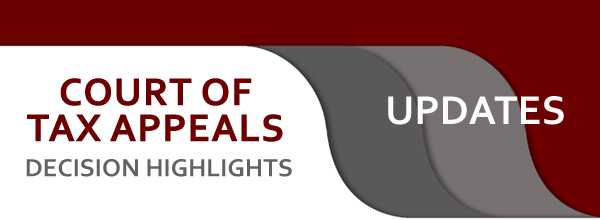
- Unavailability of the eFPS requires Taxpayers to manually file and pay on or before the tax due dates in order not to incur penalties and surcharges due to late filing. (BAP Credit Bureau, Inc. v. Commissioner of Internal Revenue CTA Case No. 9570, April 8, 2019)
- The reckoning point of the 120-day period within which the BIR should decide on the administrative claim for refund of the Taxpayer begins at the time the latter files such claim. (Kodec Precision, Inc. v. Commissioner of Internal Revenue, CTA EB No. 1762, April 8, 2019)
- Suppliers’ erroneous shifting of input VAT to Renewable Energy (RE) developers entitle the latter to reimbursement from the former, and not from the government. (Hedcor, Inc. v. Commissioner of Internal Revenue CTA EB No. 1761, April 8, 2019)
- Confirmation Letter from PEZA or SBMA is sufficient to prove customers coverage within the VAT Zero Rating under such respective laws. (Colt Commercial, Inc. v. Commissioner of Internal Revenue CTA Case No. 9340, April 10, 2019)
- The CTA has jurisdiction to determine the validity and/or constitutionality of rules and regulations, and other administrative issuances of the BIR. (San Miguel Brewery, v. Commissioner of Internal Revenue, CTA Case No. 9223, April 11, 2018)
- A VAT invoice or receipts are valid proof of zero-rated sales, for the purpose of VAT refund, provided it indicated the invoice/receipt that it is a VAT registered entity with corresponding TIN shown. (Intergraph Process & Building Solutions Philippines, Inc., v. Commissioner of Internal Revenue, CTA Case No. 9454, April 15, 2018)
- When guilt is not proven with moral certainty, presumption of innocence must be favored, and exoneration must be granted as a matter of right. (People of the Philippines vs Arnel Cortez Manaloto, CTA Crim. Case Nos. O-454, O-455, O-456, and O-457, April 16, 2019)
- Section 40(C)(2)(a) in relation to 40(C)(6)(b) of the NIRC does not require prior BIR ruling validating an exchange transaction as tax-free. (Commissioner of Internal Revenue vs. Premium Tobacco Redrying & Fluecuring Corporation, CTA EB No. 1755, (CTA Case No. 8897), April 22, 2019)
- The term 'zero-rated sale' shall be written or printed prominently on the invoice or receipt, is a law on VAT invoicing requirements for purposes of refund. (Maersk Global Services Centres (Philippines), LTD., vs. Commissioner of Internal Revenue, CTA EB No. 1805 (CTA Case No. 9015), April 29, 2019)
- Subsequent submission of supporting documents made by a taxpayer will not move the commencement of the 120-day period. (Asurion Hong Kong Limited-ROHQ vs. Commissioner of Internal Revenue, CTA EB No. 1736 (CTA Case No. 9593), April 29, 2019)
- Absent the COC from the ERC, petitioner cannot qualify for VAT zero-rating under the EPIRA law. (Hedcor Sibulan, Inc., vs. Commissioner of Internal Revenue, CTA EB No. 1751 (CTA Case 8014), April 29, 2019)
- A holding company cannot be classified as a "bank or other financial institution" and be subject to Local Business Tax. (South China Resources Inc. (now known as “SOCResources, Inc.”) vs. Office of the City Treasurer and/or Makati City, CTA AC No.197, April 30, 2019
Unavailability of the eFPS requires Taxpayers to manually file and pay on or before the tax due dates in order not to incur penalties and surcharges due to late filing.
Taxpayer was required to pay for penalties and surcharges by BIR because of its two-day late filing of its annual income tax return. The Taxpayer posits that the delay was beyond its control and due to the downtime, glitch and unavailability of eFPS. Moreover, it asserts that it followed the procedure laid down by RMC No. 20-2015 which provides for alternative steps to protect the taxpayer from the assessment of penalties. On the other hand, BIR posits that the claim has no factual and legal basis because the law sanctions the penalties for late payment of taxes.
CTA has held that RMC No. 20-2015 is not applicable to taxpayers filing BIR Form No. 1702RT; and the applicable issuance is RMC No. 14-2015. The latter RMC provides for the alternative procedure in case the ITR is not submitted via eFPS, which is to manually file the ITR and pay to Authorized Agent Banks (AAB)/Collection Agents (CA), in the RDO where it is registered. Then it should also file on or before the due dates of the respective returns and attach the proof of unsuccessful eFPS attempts, then RE-FILE ELECTRONICALLY within fifteen (15) days after the statutory deadline.
Hence, the imposition of penalties and surcharges was properly made by BIR, and the Taxpayer is not entitled to the claim of refund. (BAP Credit Bureau, Inc. v. Commissioner of Internal Revenue CTA Case No. 9570, April 8, 2019)
The reckoning point of the 120-day period within which the BIR should decide on the administrative claim for refund of the Taxpayer begins at the time the latter files such claim.
Taxpayer posits that the reckoning period of the 120-day period starts upon the completion of the submission of supporting documents, or May 9, 2017, giving BIR until September 6, 2017 to decide on the Petition, and until August 2, 2017 to elevate the claim to CTA Division. On the other hand, BIR posits that the reckoning period starts at the time of filing the claim, or November 29, 2016, or until March 29, 2017 to decide or act on the claim, and until April 28, 2017 to file its appeal before the CTA Division. Ultimately, Taxpayer appealed the decision to CTA En Banc.
CTA En Banc has held that CTA Division correctly dismissed the Petition because the Taxpayer failed to observe the 120-day period within which to file the judicial claim. Pursuant to RMC No. 54-2014 and jurisprudence, the Taxpayer is required, at the time it files its claim, to complete its supporting documents and attest that it will no longer submit any other document to prove its claim.
A taxpayer must prove not only his entitlement to a refund but also his compliance with the procedural due process as non-observance of the prescriptive periods within to file the administrative and judicial claims would result in the denial of the claim. (Kodec Precision, Inc. v. Commissioner of Internal Revenue, CTA EB No. 1762, April 8, 2019)
Suppliers’ erroneous shifting of input VAT to Renewable Energy (RE) developers entitle the latter to reimbursement from the former, and not from the government.
Taxpayer filed an administrative claim from BIR for its alleged unutilized input VAT for the third quarter of 2012. Taxpayer based its claim on R.A. No. 9513, which provides tax incentives to encourage private investments in renewable energy (RE) projects by granting VAT zero-rating to their purchases of domestic goods, property of goods necessary for the development, construction or installation of its plant facilities. BIR did not respond to the administrative claim, which led its elevation to CTA Division. Nevertheless, CTA Division denied the claim for lack of merit.
CTA En Banc has held that the above-mentioned law not only entitle RE developers to VAT zero-rating of its output VAT, but also on its input VAT on purchases. In the case of Coral Bay Nickel Corporation v. CIR, RE developers should not pay any input VAT on its purchases from its suppliers; any amount of input VAT paid by RE developers can be reimbursed from the supplier due to mistake, and not from the government.
Here, the transactions paid by Taxpayer from the suppliers include the shifting of input VAT. Therefore, the Taxpayer must ask for reimbursement from its suppliers in proportion to its erroneous payment of input VAT, and not from BIR. (Hedcor, Inc. v. Commissioner of Internal Revenue CTA EB No. 1761, April 8, 2019)
Note: Justice Manahan in her Dissenting Opinion stated that the claim for refund of excess and unutilized input VAT is governed by Section 112 of the 1997 NIRC, as amended, and to require the Taxpayer to seek refund from its suppliers instead from the government which possibly received such payments is tantamount to imposing new conditions or norms for claims for refund as provided in the above-mentioned Section, instead of merely interpreting its provisions. (Hedcor, Inc. v. Commissioner of Internal Revenue CTA EB No. 1761, April 8, 2019)
The Court of Tax Appeals is not bound by the issues specifically raised by the parties but may also rule upon related issues necessary to achieve an orderly disposition of the case.
BIR assessed the Taxpayer for deficiency taxes. Subsequently, Taxpayer filed its Petition for Review with CTA Division, and the court partially granted the petition. Subsequently, BIR filed a Petition for Review before CTA En Banc.
CTA En Banc, in exercising its exclusive appellate jurisdiction, noticed that BIR did not have a valid Letter of Authority (LOA) to assess the Taxpayer. And although such issue was not raised by the Taxpayer, Section 1, Rule 4 of the Revised Rules of Court of Tax Appeals (RRCTA) states that the Court is not bound by the issues specifically raised by the parties but may also rule upon related issues necessary to achieve an orderly disposition of the case. Therefore, CTA En Banc has the authority to consider in its decision the question on scope of authority of revenue officers who were named in the LOA even though the parties had not raised the same in their pleading or memoranda. (Commissioner of Internal Revenue v. Wellington Investment & Manufacturing Corporation CTA EB No. 1773, April 11, 2019)
Confirmation Letter from PEZA or SBMA is sufficient to prove customers’ coverage within the VAT Zero Rating under such respective laws.
The Court of Tax Appeals, in relation to Section 112 of NIRC, laid down the requisites that must be satisfied, to wit:
1. that the taxpayer is VAT-registered;
2. that the claim for refund was filed within the prescriptive period;
3. that there must be zero-rated or effectively zero-rated sales;
4. that input taxes were incurred or paid;
5. that such input taxes are attributable to zero-rated or effectively zero-rated sales; and
6. that the input taxes were not applied against any output VAT liability.
First, Taxpayer is a VAT-registered entity as evidenced by its TIN and COR. Second, CTA held that the Petition was filed on time. Third, the existence of sales to PEZA and SBMA registered corporation through a Confirmation Letter from PEZA or SBMA proves the existence of VAT Zero-rated sales. And fourth, fifth and sixth, input taxes were incurred and paid as evidenced by certified true copies of sales invoices for purchases of goods, and BOC Import Entry and Internal Revenue Declarations with confirmation receipts evidencing payment of VAT for imported goods. Moreover, the input taxes claimed were attributable to zero-rated sales of Taxpayer and not applied to its output taxes.
Therefore, Taxpayer is entitled to its claim for VAT refund for its zero-rated transactions that complied with the above-discussed requisites. (Colt Commercial, Inc. v. Commissioner of Internal Revenue CTA Case No. 9340, April 10, 2019)
The CTA has jurisdiction to determine the validity and/or constitutionality of rules and regulations, and other administrative issuances of the BIR.
The taxpayer argues that the CTA has the power to rule on the validity of RMC No. 90-2012, which imposed the excise tax rate of P20.57 for alcoholic products in bottle and in can. On the other hand, the BIR contends that the authority to declare an administrative issuance as void is conferred by the Constitution upon courts of general jurisdiction, and not on courts of special jurisdiction such as the CTA. Hence, the CTA lacks jurisdiction to declare null and void the provision of RMC No. 90-2012 imposing excise tax rate of P20.57 on alcoholic products.
The CTA held that it has jurisdiction to determine the validity and/or constitutionality of rules and regulations, and other administrative issuances of the BIR. The CTA has undoubted jurisdiction to pass upon the constitutionality or validity of a tax law or regulation when raised by the taxpayer as a defense in disputing or contesting an assessment or claiming a refund. It may likewise take cognizance of cases directly challenging the constitutionality or validity of a tax law or regulation or administrative issuance such as revenue orders, revenue memorandum circulars and rulings.
Nonetheless, the CTA held that RMC No. 90-2012, upon which the BIR anchored its imposition of a higher rate of excise tax on the taxpayer’s alcoholic products, was issued in valid exercise of the CIR’s right to interpret tax laws, a power explicitly vested in him under Section 4 of the NIRC, as amended. (San Miguel Brewery, v. Commissioner of Internal Revenue, CTA Case No. 9223, April 11, 2019)
Tax refunds are in the nature of tax exemptions and must be construed strictissimi juris against the person or entity claiming the refund.
The taxpayer filed with the BIR an administrative claim for refund of or issuance of a tax credit certificate for its alleged excess and unutilized Creditable Withholding Tax (CWT) for the year 2013. The BIR argued that the burden of proof is on the taxpayer who is charged with the heavy burden of proving that he has complied with and satisfied all the statutory and administrative requirements to be entitled to the tax refund.
The Court held that the taxpayer must comply with the three basic requisites for refund of excess CWT, to wit:
1. The claim for refund must be filed within the two-year prescriptive period as provided under Sections 204(C) and 229 of the Tax Code, as amended;
2. The fact of withholding must be established by a copy of a statement duly issued by the payor (withholding agent) to the payee, showing the amount paid and the amount of tax withheld therefrom; and
3. The income upon which the taxes were withheld must be included in the return of the recipient.
The Court held that the taxpayer’s properly substantiated CWT for CY 2013 is a lot higher than the tax credits, thus, there is no excess CWT available for refund. The court stressed that the taxpayer has the burden of proof to establish the factual basis of his or her claim for tax credit or refund. Tax refunds are in the nature of tax exemptions. As such, they are regarded as in derogation of sovereign authority and to be construed strictissimi juris against the person or entity claiming the refund. (Tullett Prebon (Philippines), Inc. v. Commissioner of Internal Revenue, CTA Case No. 9320, April 12, 2019)
A VAT invoice or receipts are valid proof of zero-rated sales, for the purpose of VAT refund, provided it indicated the invoice/receipt that it is a VAT registered entity with corresponding TIN shown.
The taxpayer sold services to various entities registered with the PEZA. It filed with the BIR an administrative claim for tax refund representing the excess input taxes that are attributable to its VAT zero-rated sales for the year 2014. The BIR argued that the taxpayer was not able to fully substantiate its claim by proper documents, such as sales invoices, official receipts and others.
The court partially granted the taxpayer’s claim. The taxpayer failed to prove that one of its clients is duly registered with the PEZA, thus the corresponding sales were denied VAT zero-rating. The CTA also emphasized that RR No. 16-05 requires that a statement that the seller is a VAT-registered person, followed by his TIN, shall be indicated in VAT invoice or VAT official receipt. Hence, it also disallowed the input taxes being claimed due to the taxpayer’s failure to meet the substantiation requirements. (Intergraph Process & Building Solutions Philippines, Inc., v. Commissioner of Internal Revenue, CTA Case No. 9454, April 15, 2019)
The fifteen-day period granted to the taxpayer to reply to the PAN before a FAN can be issued is mandatory.
The taxpayer states that the FAN was issued prior to the lapse of the fifteen (15) day period granted by law to respond to the PAN. Thus, the taxpayer argues that the FAN was issued in violation of the due process requirement, thereby rendering the FAN void. Petitioner further argues the fact that the BIR already prepared, finalized and issued the FAN prior to the lapse of the reglementary period proves that the BIR could not have considered the taxpayer’s reply to the PAN when it issued the FAN.
The BIR, on the other hand, contends that it has substantially complied with the requirements under RR 12-99 when it issued the FAN sixteen (16) days after issuance of the PAN to the petitioner. The BIR also argues that a protest against the PAN is not indispensable, and the fact of non-protest of the PAN will not render the PAN final and executory.
The CTA noted that the fifteen-day period granted to the taxpayer to reply to the PAN before a FAN can be issued is mandatory. Time is essential in this entire procedure of administrative protest because any escalation in the levels of the protest, i.e., FLD/FAN, leaves the taxpayer with fewer options, such as going to the Court of Tax Appeals on appeal or entering into a compromise settlement, among others, which all entail financial costs to the taxpayer. Hence, the period granted to assail the PAN is integral to the right of due process granted by law to the taxpayer. (Monza SPV-AMC ("Asset Management Co.), Inc. v. Commissioner of Internal Revenue, CTA Case No. 9153, April 15, 2019)
When guilt is not proven with moral certainty, presumption of innocence must be favored, and exoneration must be granted as a matter of right.
Taxpayer is charged of the crimes of (1) attempt to evade or defeat the payment of Value-Added Taxes (VAT); (2) attempt to evade or defeat tax by substantial under-declaration of income tax; (3) failure to file VAT Return; and (4) failure to supply correct and accurate information in his Income Tax Return. During the trial, it was admitted that the BIR merely relied on the deferred revenue account stated in the accused's financial statement then conclude that there is an undeclared income.
The Court ruled that for lack of supporting documents, the prosecution has failed to convince this Court that there is undeclared income. The BIR failed to prove the elements of the crimes charged. Under Sections 254 and 255 of the National Internal Revenue Code of 1997, as amended. "When guilt is not proven with moral certainty, it has been our policy of long standing that the presumption of innocence must be favored, and exoneration granted as a matter of right”. (People of the Philippines vs Arnel Cortez Manaloto, CTA Crim. Case Nos. O-454, O-455, O-456, and O-457, April 16, 2019)
Section 40(C)(2)(a) in relation to 40(C)(6)(b) of the NIRC does not require prior BIR ruling validating an exchange transaction as tax-free.
The BIR assessed the taxpayer for deficiency income tax, VAT and DST for the transfer of assets of taxpayer to Fortune Tobacco Corporation (FTC) in exchange for the latter’s shares. The BIR contends that the provisions of RR No. 18-2001 are mandatory preconditions for a taxpayer to avail of the benefits of Section 40(C)(2) of the NIRC, as amended. Specifically, a request for ruling on such matter, plus a BIR Certification/Ruling affirming the transaction as a tax-free exchange must be appended to requesting party's audited financial statement and income tax returns during the year of exchange must first be complied with.
The court ruled that nowhere in Section 40(C)(2)(a) in relation to 40(C)(6)(b) of the NIRC, as amended, that requires a prior BIR ruling validating an exchange transaction as tax-free before respondent may reap the benefits of the foregoing provisions. The statute only requires a corporation to exchange all or substantially all of its property for shares of stock of another corporation under a legitimate business objective.
Neither RR No. 18-2001 mandates a tax certification or ruling confirming the exchange as being absolved from tax as a prerequisite for the enjoyment of the benefit conferred under Section 40(C)(2) of the NIRC, as amended. It merely serves as a guide for the BIR to track the basis of a property and/or shares of stock received through an exchange transaction contemplated by the foregoing provision in the event of subsequent disposition thereof. (Commissioner of Internal Revenue vs. Premium Tobacco Redrying & Fluecuring Corporation, CTA EB No. 1755, (CTA Case No. 8897), April 22, 2019)
The term 'zero-rated sale' shall be written or printed prominently on the invoice or receipt, is a law on VAT invoicing requirements for purposes of refund.
Taxpayer appealed the decision of the Court in Division denying taxpayer claim for refund on the ground that that the ORs issued from July to December 2013 do not bear the words "zero-rated sale," and ruled to be in violation of the invoicing requirements prescribed by Section 113 of the NIRC. Taxpayer argues that the ORs were printed and issued strictly in compliance with the new invoicing requirements and format prescribed under Revenue Regulations (RR) No. 18-2012 and Revenue Memorandum Order (RMO) No. 12-2013.
The Court ruled that it is explicit from the provisions of Section 113 of the NIRC of 1997 that if the sale is subject to zero-percent VAT, the term "zero-rated sale" shall be written or printed prominently on the invoice or receipt. Even prior to the enactment of RR No. 18-2012 and RMO No. 12-2013, a taxpayer is required to issue an OR for the sale of services, bearing the words "zero-rated sales" for zero-rated transactions.
Section 113 of the NIRC of 1997 is a law on VAT invoicing requirements for purposes of a refund, as opposed to RR 18-2012 and RMO No. 12-2013, which are mere regulations intended to govern the Processing of ATP, ORs, Sis and Other CIs in the Interim Period until On-line ATP System. (Maersk Global Services Centres (Philippines), LTD., vs. Commissioner of Internal Revenue, CTA EB No. 1805 (CTA Case No. 9015), April 29, 2019)
Subsequent submission of supporting documents made by a taxpayer will not move the commencement of the 120-day period.
Taxpayer filed a petition for review on the decision of the court division granting the Motion to Dismiss, on the ground that the court division has no jurisdiction over the case since the judicial claim for refund or tax credit was belatedly filed by taxpayer. The taxpayer contends that the BIR requested additional documents in support of the administrative claim which extended the period to file judicial claim.
The Court ruled that under RMC No. 54-2014, the reckoning of the 120-day period has been withdrawn from the taxpayer, since it requires him at the time of filing of the claim to complete the supporting documents and to attest that he will no longer submit any other document to prove the claim; and that the taxpayer is barred from submitting additional documents after filing the administrative claim. The fact that CIR, instead of deciding on the taxpayer claim, asked for additional documents is immaterial. Any subsequent submission of supporting documents made by taxpayer will not move the commencement of the 120-day period. (Asurion Hong Kong Limited-ROHQ vs. Commissioner of Internal Revenue, CTA EB No. 1736 (CTA Case No. 9593), April 29, 2019)
Any assessment by a Revenue Officer who is not duly authorized to do so, is a complete nullity.
The BIR appealed the decision of the division cancelling, the FAN, PCL and FNBS issued by the CIR on the ground that a letter of authority is absent and thus the assessment is done without authority. The CIR however argues that the taxpayer filed its protest out of time.
The Court ruled that before any revenue officer may conduct an examination and issue an assessment, there must be a valid grant of authority in his or her favor. The authority of BIR examiners to conduct audit investigation goes into the validity of an assessment itself; as such, any assessment arising from the conduct of audit examination of a taxpayer's books of accounts by a BIR examiner who is not duly authorized to do so, is a complete nullity. Thus, considering that the Revenue Officers who conducted the examination in this case were not validly authorized to do so, the assessment issued against taxpayer is void. (Commissioner of Internal Revenue vs. Catering Professionals, Inc. CTA EB No. 1818 (CTA Case No 8852), April 29, 2019)
Absent the COC from the ERC, petitioner cannot qualify for VAT zero-rating under the EPIRA law.
Taxpayer appealed the decision of the court division denying the claim for refund of the alleged unutilized input value-added tax (VAT) on purchases of goods and services for the fourth quarter of calendar year 2007.
The Court ruled that pursuant to the EPIRA law and its implementing rules, there is a need for a company to secure a Certificate of Compliance (COC) from the Energy Regulatory Commission (ERC) in order to be registered as a generation company and to be able to engage in the generation of electricity. Once considered as a generation company under the EPIRA law, the sales of generated power by such generation company shall be VAT zero-rated. Failure to present a COC before the Courts is fatal to a taxpayer's claim.
In the present case petitioner did not present the COC from the ERC. Accordingly, absent the COC from the ERC, petitioner cannot qualify for VAT zero-rating under the EPIRA law. (Hedcor Sibulan, Inc., vs. Commissioner of Internal Revenue, CTA EB No. 1751 (CTA Case 8014), April 29, 2019)
Input VAT deducted as "VAT Refund/TCC Claimed" in a quarter should not form part or carried over of the excess input vat of the succeeding quarter.
Taxpayer filed a claim for the refund or issuance of tax credit certificate (TCC) in the amount of P16,939,138.14, allegedly representing unutilized input value-added tax attributable to its zero-rated sales/receipts for the 1st, 2nd, 3rd and 4th quarters of taxable year 2014.
The Court ruled that although the taxpayer carried over the claimed input VAT of P16,939,138.14, which includes the excess input VAT credit of P12,670,317.45, to the succeeding quarters up to the first quarter of TY 2016, the same was deducted as "VAT Refund/TCC Claimed" in the first quarter of taxable year 2016. As such, the subject claim should no longer form part of the excess input VAT of P84,006,802.6843 as of the end of the first quarter of TY 2016, which was to be carried over to the next succeeding second quarter of TY 2016.
However, in taxpayers Amended Quarterly VAT Return for the second quarter of TY 2016, petitioner reflected the amount of P94,060,638.52 as input tax carried over from previous period, which is P10,053,835.84 higher than what petitioner was supposed to carry over. Apparently, part of the subject claim was actually carried over to the next second quarter of TY 2016. Consequently, the valid excess input VAT attributable to zero-rated sales shall be reduced by P10,053,835.84. Accordingly, the excess input VAT available for refund or TCC amounts to P2,616,481.61 (P12,670,317.45 less P10,053,835.84). (Amadeus Marketing Philippines, Inc., vs Commissioner of Internal Revenue, CTA Case No.9441, April 30, 2019)
A holding company cannot be classified as a "bank or other financial institution" and be subject to Local Business Tax.
The City Treasurer's Office of Makati City classified the taxpayer as a "Manufacturer" and assessed with deficiency local business taxes. The taxpayer filed a protest letter but was denied by the City Treasurer and reclassified taxpayer as holding company and assessed taxpayer for deficiency business taxes. Taxpayer claims that as holding company it not subject to local business tax. The Court ruled that in the Michigan Holdings, Inc. vs. The City Treasurer of Makati City, Nelia A. Barlis, this Court ruled that dividend income is not subject to LBT except when levied on banks and other financial institutions and it is clear that the taxpayer as a holding company cannot be classified as a "bank or other financial institution". The records of this case do not show that taxpayer is engaged in activities that may be classified as performing functions similar to a bank or other financial institution as defined by pertinent regulations. (South China Resources Inc. (now known as “SOCResources, Inc.”) vs. Office of the City Treasurer and/or Makati City, CTA AC No.197, April 30, 2019)

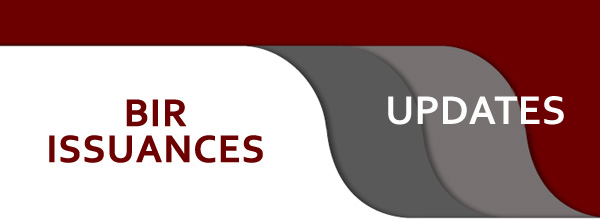
- Revenue Regulations No. 4-2019, April 8, 2019 – This Regulation implements the rules on Republic Act 11213, Otherwise known as the “Tax Amnesty Act”.
- Revenue Regulations No. 5-2019, April 12, 2019 – This Regulation provides for the Implementing Rules for the Tax lncentives Provisions of Republic Act No. 10771, Otherwise Known as the "Philippine Green Jobs Act of 2016".
- Revenue Memorandum Circular No. 47-2019, April 16, 2019 – This Circular provides for the Revised Guidelines and Mandatory Requirements for the Processing and Grant of Value-Added Tax (VAT) Refund Claims Within the 90-Day Period Pursuant to Section 112 of the Tax Code of 1997, as Amended.
Revenue Regulations No. 4-2019, April 8, 2019. This Regulation implements the rules on Republic Act 11213, Otherwise known as the “Tax Amnesty Act”.
This RR implements rules and regulations and provides guidelines on the processing of Tax Amnesty application. Amongst other, it provides the manner of availment of Tax Amnesty on Tax delinquencies and the coverage of such amnesty.
The tax delinquency of those who avail of the Tax Amnesty on Delinquencies under the Regulations, upon full compliance with all conditions set forth in the Regulations, shall be considered settled, and the criminal case in connection therewith and its corresponding civil or administrative case, if applicable, shall be terminated. The taxpayer shall be immune from all suits or actions, including the payment of said delinquency or assessment, as well as additions thereto, and from all appurtenant civil, criminal and administrative cases, and penalties under the 1997 Tax Code, as amended, as such relate to the internal revenue taxes for taxable years that are subject of the tax amnesty availed of.
Revenue Regulations No. 5-2019, April 12, 2019. This Regulation provides for the Implementing Rules for the Tax lncentives Provisions of Republic Act No. 10771, Otherwise Known as the "Philippine Green Jobs Act of 2016"
This RR implements the Tax Provisions of the Philippine Green Jobs Act of 2016. Qualified business enterprise shall be entitled to a special deduction from their taxable income equivalent to fifty percent (50%) of the total expenses for skills, training and research development expenses promoting green economy and creating green jobs as defined in the said Act. Procedures for the availment of tax incentive is likewise embodied in this RR.
Revenue Memorandum Circular No. 47-2019, April 16, 2019. This Circular provides for the Revised Guidelines and Mandatory Requirements for the Processing and Grant of Value-Added Tax (VAT) Refund Claims Within the 90-Day Period Pursuant to Section 112 of the Tax Code of 1997, as Amended
This Circular is issued to provide uniform guidelines and prescribe the revised mandatory documentary requirements in the processing and grant of VAT refund claims under Section 112 of the Tax Code of 1997, as amended, except claims processed under the jurisdiction of the Legal Service, thereby amending certain provisions in Revenue Memorandum Circular (RMC) Nos. 5- 2011 and 17-2018.
Revenue Memorandum Circular No. 49-2019, April 29, 2019. This Circular provides for the Decentralization on the Accreditation of Cash Register Machines (CRMs), Point-of-Sale (POS) Machines, Sales Receipting Software, and Other Sales Machines Generating Receipts/ Invoices at the National Office, Revenue Region and Revenue District Office Levels.
This RMO creates the Accreditation Board (AB) LTS and RRs tasked to approve, disapprove, and/or revoke the Certificate of Accreditation for sales machines/software. The general functions of each group comprising the Board is likewise discussed in the subject RMO.

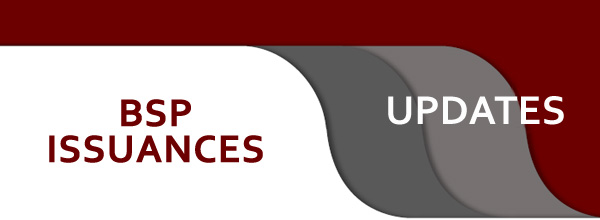
- BSP Circular No. 1038, April 22, 2019- This Circular amends the regulations on the election and employment of Foreign National as Directors and Officer
BSP Circular No. 1038, April 22, 2019. This Circular amends the regulations on the election and employment of Foreign National as Directors and Officers.
This Circular is issued to amend the Manual of Regulations for Non-bank Financial Institutions (MORNBFI) on the election of election of foreign nationals as directors of quasi-banks and/or other Bangko Sentral ng Pilipinas – supervised financial institutions and the employment of foreign nationals as officers or employees of financing companies.
Under this Circular, non-Filipino citizens may become members of the board of directors of a BSFI.

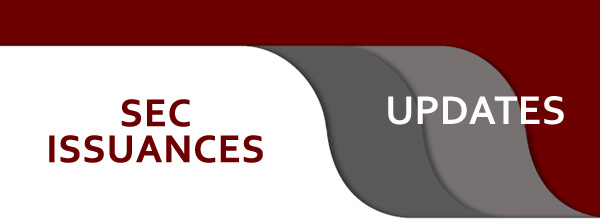
- SEC Memorandum Circular No. 8, April 25, 2019- This Circular serves as Guidelines on the Issuance of Sustainability Bonds under the ASEAN Sustainability Bonds Standards in the Philippines
- SEC Memorandum Circular No. 9, April 25, 2019- This Circular serves as Guidelines on the Issuance of Social Bonds under the ASEAN Sustainability Bonds Standards in the Philippines
- SEC Notice issued April 8, 2019- SEC will implement the Collection of Documentary Stamp Tax (DST)
SEC Memorandum Circular No. 6, April 4, 2019. This Circular discusses the Philippines Interpretations Committee Questions & Answers (PIC Q&A) No. 2019-03 serving as Revenue Recognition Guidance for Sugar Millers.
This Memorandum Circular provide for a one (1) year relief to the Philippine sugar industry by deferring the implementation of the PIC Q&A 2019-03 on the milling/out sharing arrangements of sugar millers and its planters. A sugar miller may opt not to avail of the relief provided. Sugar millers who opted to avail of the relief s required to make a disclosure in the Notes to the Financial Statements the accounting policies applied, discussion of the deferral of the subject implementation issues in the PIC Q&A and a qualitative discussion of the impact in the Financial Statements had the PIC Q&A been adopted. If such deferral will result to a change in accounting policy, it should be accounted for.
SEC Memorandum Circular No. 8, April 25, 2019. This Circular serves as Guidelines on the Issuance of Sustainability Bonds under the ASEAN Sustainability Bonds Standards in the Philippines.
This Memorandum Circular provides for the guidelines to supplement the requirements under Section 8 and 12 of the SRC. The Guidelines provides for the applicability of the ASEAN Sustainability Bonds Standards shall apply to ASEAN Sustainability Bonds Standards in the Philippines and ICMA Sustainability Bond Guidelines have suppletory application to the latter. The issuer of ASEAN Sustainability Bonds must comply with both ASEA GBS and the ASEAN SBS. The Commission also reserves the right to direct any issuer from issuing the “ASEAN Sustainability Bonds” label.
SEC Memorandum Circular No. 9, April 25, 2019. This Circular serves as Guidelines on the Issuance of Social Bonds under the ASEAN Sustainability Bonds Standards in the Philippines.
This Memorandum provides for the guidelines that will primarily govern the issuance of ASEAN Social Bonds where proceeds will be exclusively applied to finance or refinance in part, or in full, new and/or existing eligible Social Projects. The Guidelines provides for the eligibility requirements of the Issuer and the issuance per se. It also discussed the use and management of the proceeds including its disclosures, the eligible projects, the process of project selection and evaluation, the reporting requirements and the conduct of external review thereafter.
SEC Notice issued April 8, 2019. SEC will implement the Collection of Documentary Stamp Tax (DST).
Effective April 22, 2019, SEC shall collect Documentary Stamp Tax (DST) amounting Thirty (P30.00) for every certificate SEC will issue pursuant to NIRC, as amended by TRAIN Law.

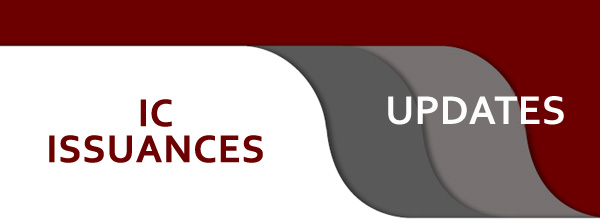
- IC Circular Letter No. 2019-15, April 22, 2019- This Circular provides for Guidelines for the Filing of HMO’s 2018 Financial Statements (FS).
- IC Circular Letter No. 2019-16, April 22, 2019- This Circular provides for the Discount Rates for Non-Life Insurance Policy Reserves as of 31 March 2019.
- IC Circular Letter No. 2019-17, April 22, 2019- This Circular provides for the Discount Rates for Life Insurance Policy Reserves as of 31 March 2019.
- IC Circular Letter No. 2019-18, April 22, 2019- This Circular provides for the Guidelines on the Use of Business Names.
-
IC Legal Opinion No. 2019-06, April 2, 2019- Inquiry on whether CCT MBA members may validly designate KKMC as beneficiary of their insurance policy with CCT MBA’s Basic Life Insurance Plan or BLIP.
IC Circular Letter No. 2019-15, April 22, 2019. This Circular provides for Guidelines for the Filing of HMO’s 2018 Financial Statements (FS).
This Circular is issued pursuant to EO No. 192 (s. 2015) transferring the jurisdiction over HMO’s from DOH to IC, requiring all HMO’s to comply with the guidelines for the submission of their 2018 FS. The FS must be submitted to the HMO Division of the IC and comply with the pro forma template provided by the Commission. Failure to follow the pro-forma template, incomplete documents and lacking information will warrant the non-acceptance of the Submission. A filing fee of Twenty Thousand Pesos (Php20,000.00) and a Legal Research Fee of Two Hundred Pesos (Php200.00) is imposed in every submission. Failure to submit the documents within the prescribed deadline shall cause the imposition of penalty of Five Thousand Pesos (Php5,000.00) per day of delay pursuant to CL No. 2016-41.
IC Circular Letter No. 2019-16, April 22, 2019. This Circular provides for the Discount Rates for Non-Life Insurance Policy Reserves as of 31 March 2019..
This Circular provides for the schedule of Peso and Dollar Spot and Forward rates which will be used in discounting the cash flows in the calculation of policy reserves as of March 31, 2019. The Peso and Dollar Spot and Forward rates to be used for discounting cash flows with duration of more than 20 years were determined using the 2-year moving-average of the 20-year government bond yield rate. The Peso Spot and Forward rates derived from the PHP BVAL Reference rates from Bloomberg and the Dollar Spot and Forward rates derived from the International Yield Curve from Bloomberg, shall be used for Peso-denominated and Dollar-denominated policies, respectively.
IC Circular Letter No. 2019-17, April 22, 2019. This Circular provides for the Discount Rates for Life Insurance Policy Reserves as of 31 March 2019.
This Circular provides for the schedule of Peso and Dollar Spot and Forward rates which will be used in discounting the cash flows in the calculation of policy reserves as of March 31, 2019. The Peso Spot and Forward rates derived from the PHP BVAL Reference rates from Bloomberg and the Dollar Spot and Forward rates derived from the International Yield Curve from Bloomberg, shall be used for Peso-denominated and Dollar-denominated policies, respectively. The Peso and Dollar Spot and Forward rates to be used for discounting cash flows with duration of more than 20 years were determined using the 2-year moving-average of the 20-year government bond yield rate.
IC Circular Letter No. 2019-18, April 22, 2019. This Circular provides for the Guidelines on the Use of Business Names.
This Circular provides for Guidelines in using Business Name in advertising, marketing, or promotional purposes and as used in Contracts. Violation of the Guidelines will warrant the imposition of penalty in the amount not exceeding Two Thousand Pesos (Php2,000.00).
IC Legal Opinion No. 2019-06, April 2, 2019. Inquiry on whether CCT MBA members may validly designate KKMC as beneficiary of their insurance policy with CCT MBA’s Basic Life Insurance Plan or BLIP.
In this legal opinion, CCT MBA intends to name KMMC (a cooperative advocating the welfare of street dwellers) as beneficiary of the insurance coverage with BLIP. The insurance policies were taken by CCT MBA members who are likewise members of KMMC, who can no longer designate their beneficiaries. The IC opined that CCT MBA members have insurable interest over his own self, hence, they can insure their own life. Since these members are likewise KMMC members, KMMC may be validly designated as their beneficiary. However, KMMC cannot take an insurance policy over the lives of its members since the latter has no insurable interest over the lives of its members.

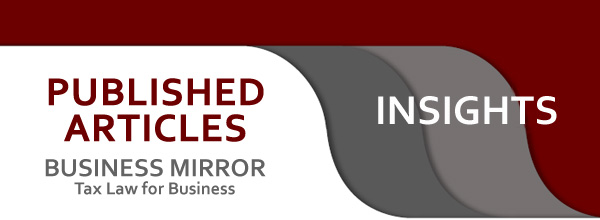
Tax Incentives for Green Jobs
By Rodel C. Unciano
The blistering summer heat we are currently encountering reminds us of the importance of giving our share in protecting our environment as a responsible citizen.
In the Philippines, unknown to many, we have a law called the “Philippine Green Jobs Act of 2016” (Republic Act 10771), which recognizes the employment of green jobs as an important tool in preserving our environment by giving incentives to qualified business enterprises.
As defined under the law, green jobs refer to employment that contributes to preserving or restoring the quality of the environment, be it in the agriculture, industry or services sector. This includes jobs that help to protect ecosystems and biodiversity, reduce energy, materials and water consumption through high-efficiency strategies, decarbonize the economy and minimize, or altogether avoid, generation of all forms of waste and pollution. Green jobs are decent jobs that are productive, respect the rights of workers, deliver a fair income, provide security in the workplace and social protection for families, and promote social dialogue.
Under the law, qualified business enterprises that promote green jobs are entitled to a special deduction from the taxable income equivalent to 50% of the total expense for skills training and research development expenses. This special deduction is over and above the allowable ordinary and necessary business deductions for said expenses under the Tax Code, as amended.
In addition, a qualified enterprise may avail itself of a tax- and duty-free importation of capital equipment, provided that the capital equipment is actually, directly and exclusively used in the promotion of green jobs of the business enterprise.
In order to avail itself of the incentives, a qualified business enterprise has to register or update registration with the Bureau of Internal Revenue by submitting certification issued by the Climate Change Commission that the enterprise is qualified to avail itself of the incentives, pursuant to Revenue Regulations 5-2019 recently issued by the BIR. The registration has to be made with the BIR’s Revenue District Office (RDO) where the qualified business enterprise is registered.
Upon filing of the income tax returns/annual information returns, the availing enterprise shall furnish the RDO of a sworn list of the total expenses paid or incurred for skills training and research development during the year. Further, the enterprise is required to submit a sworn list of the activities and/or projects undertaken by the institution and the cost of each undertaking indicating in particular where and how the expenses were paid or incurred. Also, the qualified enterprise has to submit a sworn declaration that the expenses paid or incurred for skills training research development has a direct connection or relation to the activities and/or projects of the business enterprise that generate or sustain green jobs.
The deduction shall be availed of on the taxable year in which the expenses have been paid or incurred. The expenses can be substantiated with sufficient evidence, such as official receipts, delivery receipts and other adequate records showing the amount of expenses being claimed as deduction and the direct connection or relation of the expenses incurred for skills training and research development of the business enterprise.
The grant of tax incentives on “green jobs” is consistent with the State’s objective of preserving the environment, conserve natural resources for the future generation and ensure the sustainable development of the country and its transition into a green economy.
----------------------------------------------
For inquiries on the article, you may call or email
ATTY. RODEL C. UNCIANO
Partner
T: +63 2 403 2001 loc. 140
This email address is being protected from spambots. You need JavaScript enabled to view it.



DISCLAIMER: The contents of this Insights are summaries of selected issuances from various government agencies, Court decisions and articles written by our experts. They are intended for guidance only and as such should not be regarded as a substitute for professional advice.
Copyright © 2019 by Du-Baladad and Associates (BDB Law). All rights reserved. No part of this issue covered by this copyright may be produced and/or used in any form or by any means – graphic, electronic and mechanical without the written permission of the publisher.






